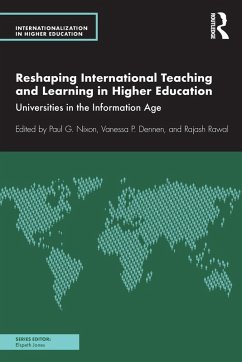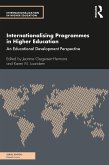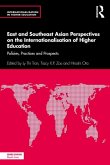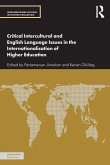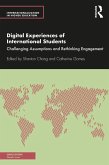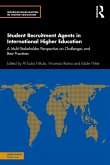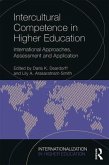Reshaping International Teaching and Learning in Higher Education
Universities in the Information Age
Herausgeber: Nixon, Paul G.; Rawal, Rajash; Dennen, Vanessa P.
Reshaping International Teaching and Learning in Higher Education
Universities in the Information Age
Herausgeber: Nixon, Paul G.; Rawal, Rajash; Dennen, Vanessa P.
- Broschiertes Buch
- Merkliste
- Auf die Merkliste
- Bewerten Bewerten
- Teilen
- Produkt teilen
- Produkterinnerung
- Produkterinnerung
This volume provides a broad examination of how technology and globalisation have influenced contemporary higher education institutions and how moves towards internationalisation within and between educational providers continue to be a force for change in this context.
Andere Kunden interessierten sich auch für
![Internationalising Programmes in Higher Education Internationalising Programmes in Higher Education]() Internationalising Programmes in Higher Education51,99 €
Internationalising Programmes in Higher Education51,99 €![East and Southeast Asian Perspectives on the Internationalisation of Higher Education East and Southeast Asian Perspectives on the Internationalisation of Higher Education]() East and Southeast Asian Perspectives on the Internationalisation of Higher Education50,99 €
East and Southeast Asian Perspectives on the Internationalisation of Higher Education50,99 €![Critical Intercultural and English Language Issues in the Internationalisation of Higher Education Critical Intercultural and English Language Issues in the Internationalisation of Higher Education]() Critical Intercultural and English Language Issues in the Internationalisation of Higher Education38,99 €
Critical Intercultural and English Language Issues in the Internationalisation of Higher Education38,99 €![The Land-Grant Colleges and the Reshaping of American Higher Education The Land-Grant Colleges and the Reshaping of American Higher Education]() The Land-Grant Colleges and the Reshaping of American Higher Education58,99 €
The Land-Grant Colleges and the Reshaping of American Higher Education58,99 €![Digital Experiences of International Students Digital Experiences of International Students]() Digital Experiences of International Students51,99 €
Digital Experiences of International Students51,99 €![Student Recruitment Agents in International Higher Education Student Recruitment Agents in International Higher Education]() Student Recruitment Agents in International Higher Education41,99 €
Student Recruitment Agents in International Higher Education41,99 €![Intercultural Competence in Higher Education Intercultural Competence in Higher Education]() Intercultural Competence in Higher Education40,99 €
Intercultural Competence in Higher Education40,99 €-
-
-
This volume provides a broad examination of how technology and globalisation have influenced contemporary higher education institutions and how moves towards internationalisation within and between educational providers continue to be a force for change in this context.
Produktdetails
- Produktdetails
- Internationalization in Higher Education Series
- Verlag: Taylor & Francis Ltd
- Seitenzahl: 238
- Erscheinungstermin: 22. Februar 2021
- Englisch
- Abmessung: 234mm x 156mm x 13mm
- Gewicht: 362g
- ISBN-13: 9780367230432
- ISBN-10: 0367230437
- Artikelnr.: 60352981
- Herstellerkennzeichnung
- Libri GmbH
- Europaallee 1
- 36244 Bad Hersfeld
- gpsr@libri.de
- Internationalization in Higher Education Series
- Verlag: Taylor & Francis Ltd
- Seitenzahl: 238
- Erscheinungstermin: 22. Februar 2021
- Englisch
- Abmessung: 234mm x 156mm x 13mm
- Gewicht: 362g
- ISBN-13: 9780367230432
- ISBN-10: 0367230437
- Artikelnr.: 60352981
- Herstellerkennzeichnung
- Libri GmbH
- Europaallee 1
- 36244 Bad Hersfeld
- gpsr@libri.de
Paul G. Nixon is a Principal Lecturer in Political Science at The Hague University of Applied Sciences, The Netherlands. Vanessa P. Dennen is a Professor of Instructional Systems and Learning Technologies at Florida State University, USA. Rajash Rawal is Vice President of The Hague University of Applied Sciences, The Netherlands.
Introduction PART I Digital learning and new technologies in the
internationalisation of higher education 1 New technological capabilities
and the societal, ethical, and legal tensions they create in today's
digital learning setting 2 Internationalisation in the classroom and
questions of alignment: Embedding COIL in an internationalised curriculum 3
Intercultural competences for all 4 Taking the distance out of distance
education: Increasing student engagement 5 Mediated identities, context
collapse, and cultural elements of networked learning 6 Intercultureality:
Making global education work in local contexts PART II Universities
reshaping teaching and learning through ICT use in different national
contexts 7 Is digital distance education a strategy for development?:
Exploring the digitization of distance education in Ghana 8 A pedagogical
sequence for the development of foreign language students' intercultural
competence 9 Social media's support for creativity, innovation, and
networked connections in higher education: A Thai perspective 10 Trust,
privacy, and self-disclosure on Facebook: Institutional implications of
social media use among American and Turkish students 11 "Dad, you are a
YouTuber!": A case for absence, silence, and variance in online video
lecturing 12 The international other in online learning: Four stories from
a graduate program 13 Learning to teach and to be a teacher: Brazil's "3rd
Space Program" and its implications for curriculum design 14 Engaging the
students' brain: Using documentaries to teach critical thinking Conclusion
internationalisation of higher education 1 New technological capabilities
and the societal, ethical, and legal tensions they create in today's
digital learning setting 2 Internationalisation in the classroom and
questions of alignment: Embedding COIL in an internationalised curriculum 3
Intercultural competences for all 4 Taking the distance out of distance
education: Increasing student engagement 5 Mediated identities, context
collapse, and cultural elements of networked learning 6 Intercultureality:
Making global education work in local contexts PART II Universities
reshaping teaching and learning through ICT use in different national
contexts 7 Is digital distance education a strategy for development?:
Exploring the digitization of distance education in Ghana 8 A pedagogical
sequence for the development of foreign language students' intercultural
competence 9 Social media's support for creativity, innovation, and
networked connections in higher education: A Thai perspective 10 Trust,
privacy, and self-disclosure on Facebook: Institutional implications of
social media use among American and Turkish students 11 "Dad, you are a
YouTuber!": A case for absence, silence, and variance in online video
lecturing 12 The international other in online learning: Four stories from
a graduate program 13 Learning to teach and to be a teacher: Brazil's "3rd
Space Program" and its implications for curriculum design 14 Engaging the
students' brain: Using documentaries to teach critical thinking Conclusion
Introduction PART I Digital learning and new technologies in the
internationalisation of higher education 1 New technological capabilities
and the societal, ethical, and legal tensions they create in today's
digital learning setting 2 Internationalisation in the classroom and
questions of alignment: Embedding COIL in an internationalised curriculum 3
Intercultural competences for all 4 Taking the distance out of distance
education: Increasing student engagement 5 Mediated identities, context
collapse, and cultural elements of networked learning 6 Intercultureality:
Making global education work in local contexts PART II Universities
reshaping teaching and learning through ICT use in different national
contexts 7 Is digital distance education a strategy for development?:
Exploring the digitization of distance education in Ghana 8 A pedagogical
sequence for the development of foreign language students' intercultural
competence 9 Social media's support for creativity, innovation, and
networked connections in higher education: A Thai perspective 10 Trust,
privacy, and self-disclosure on Facebook: Institutional implications of
social media use among American and Turkish students 11 "Dad, you are a
YouTuber!": A case for absence, silence, and variance in online video
lecturing 12 The international other in online learning: Four stories from
a graduate program 13 Learning to teach and to be a teacher: Brazil's "3rd
Space Program" and its implications for curriculum design 14 Engaging the
students' brain: Using documentaries to teach critical thinking Conclusion
internationalisation of higher education 1 New technological capabilities
and the societal, ethical, and legal tensions they create in today's
digital learning setting 2 Internationalisation in the classroom and
questions of alignment: Embedding COIL in an internationalised curriculum 3
Intercultural competences for all 4 Taking the distance out of distance
education: Increasing student engagement 5 Mediated identities, context
collapse, and cultural elements of networked learning 6 Intercultureality:
Making global education work in local contexts PART II Universities
reshaping teaching and learning through ICT use in different national
contexts 7 Is digital distance education a strategy for development?:
Exploring the digitization of distance education in Ghana 8 A pedagogical
sequence for the development of foreign language students' intercultural
competence 9 Social media's support for creativity, innovation, and
networked connections in higher education: A Thai perspective 10 Trust,
privacy, and self-disclosure on Facebook: Institutional implications of
social media use among American and Turkish students 11 "Dad, you are a
YouTuber!": A case for absence, silence, and variance in online video
lecturing 12 The international other in online learning: Four stories from
a graduate program 13 Learning to teach and to be a teacher: Brazil's "3rd
Space Program" and its implications for curriculum design 14 Engaging the
students' brain: Using documentaries to teach critical thinking Conclusion

